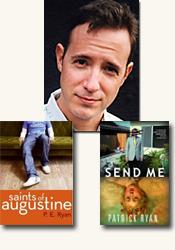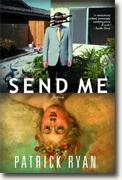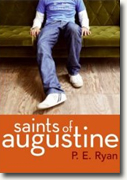author interview
book reviews:
· general fiction
· chick lit/romance
· sci-fi/fantasy
· graphic novels
· nonfiction
· audio books
· author interviews
· children's books @
curledupkids.com
· DVD reviews @
curledupdvd.com
newsletter
win books
buy online
links
home
for authors
& publishiss
for reviewers

|
|||||
 
Michael Leonard interviewed Patrick Ryan, author of Send Me Interviewer Michael Leonard: Send Me Patrick Ryan: Send Me Both are aimed at very different target audiences. Send Me The experience of writing the two books was very different. Basically, I agonized over nearly every scene in Send Me Send Me The structure of Send Me
I see Teresa in that early chapter at a point of utter desperation, trying to do what she thinks is right. At the same time, she’s fantasizing about leaving her family, just as husband did. She’s at a crossroads: rise to the occasion, or flee. Rising to the occasion means trying to reclaim the husband who’s left her, even though their relationship wasn’t ideal. Fleeing is something she realizes she can’t do (and by the end of the novel, I would hope the reader feels she’s rewarded for never having done so—though so many characters have fled her). When Dermot leaves, Teresa is thrown for a loop and basically left to fend for herself with her two young children, Katherine and Matt. What inner strengths do you think Teresa draws upon in order to cope with such a crisis? I think Teresa is drawing from inner strengths she doesn’t even know she has. It’s what happens when an unexpected crisis arises in your life: you either perish from the strain or, more likely, you go a little crazy and find ways to survive. Teresa has an uncle who’s trying to look out for her, and she wants to do well in his eyes, but can’t be the person he wants her to be. Likewise, an alcoholic co-worker who could step in and possibly improve her situation is courting her, but she can’t go down that road. I don’t even think she realizes she’s surviving, just like one isn’t aware of one’s own breathing. She’s just living and, hence, surviving. When Teresa meets the handsome Roy, she's charmed, he's even described as "a solid tank of a man." Why do you think Roy offers Teresa? And in turn, why do you think Roy eventually drifts away from Teresa and from his family and into the arms of another woman? Roy and Teresa were in love at one point. I want to believe that, anyway. Early on, he liked the idea of having a family. Then, as their relationship soured or, more simply, played itself out, he became irritated at being the father of four and married to a woman he no longer loved. Most men, I believe, would stick with the situation—even if they take another lover in the process. But Roy panics and takes the open door: he steps out of one life and into another (with Lorena). It’s a cowardly thing to do, and he suffers for it in his later years. But again, I wasn’t interested in villainizing him for his actions; rather, I was interested in exploring his character from the inside, exploring his point of view. As the children become teenagers and grow into adulthood, each develops their own quirks and idiosyncrasies, becoming almost like a model for dysfunction. How difficult was it to imbue each of them with a sense of their own individuality? The siblings were always so different in my mind that imbuing them with individuality wasn’t much of a hurdle. Matt was the toughest: he leaves home first, is out of the picture, and is a bit of a cipher. He gets the least “mic time” in the novel. He’s central in the chapter in which his father dies, but other than that, where is he? I picture him in Las Vegas, and imply that in the book. But I don’t have much of a sense of how he developed after he left Utica. I will, in the sequel. While Frankie is clearly the most original and eccentric of the siblings, I was just as interested in Karen, who goes from being a mouthy teenager to a woman pretending to be born again and hiding in a bad marriage, occasionally cheating. Frankie seems to be the liveliest child, he's a dreamer who is obsessed with space travel and aliens, and who then becomes a gay party boy when attending a Florida university. Why do you think it is about Frankie that sets him apart? And what do you think he ultimately gets out of the world of space and science fiction? Frankie came out of nowhere, and while a couple of readers have let me know they just don’t “get” him, many have said he’s their favorite. I’ve already written another story about him, recently published in an anthology called Between Men. What sets him apart from the other characters is that he has almost no sense of self-consciousness, almost no ego, and the ability to believe in nearly everything. That allows him to come out of the closet so easily and at such an early age, and allows him to hold onto his interest in aliens well into adulthood. He’s utterly unconcerned with what other people think of him. But he is aware that the world he lives in is far from ideal, and constructs an escape from it in the form of alien rescue. Once his HIV-related dementia sets in, this is only heightened. Frankie also has an interesting relationship with his introspective older brother Joseph. As both are gay, one would expect them to be close, yet they never really hit it off. Why do think this is so? I think Frankie and Joe never get particularly close mainly because Joe takes so long to come out of the closet, while Frankie rockets out of it at fourteen. Also, Frankie’s quirkiness keeps Joe at bay somewhat (though it’s not Frankie’s intention). The chapter “That Daring Young Man” is possible my favorite in the book because it’s about a brief period of overlap wherein both brothers become close—even while they’re both going through crises of sorts. All of the kids are quite rebellious in their own ways, especially Karen (Katherine) who is set adrift and makes some questionable choices along the way. Why do you think Karen aches so much to get away from her family, and what do you think she's ultimately looking for? As a child and teenager, Karen is the only other woman in the house, and she doesn’t identify with her mother, so she feels a keen sense of isolation. She had one glimmering moment: when she became thankful for her stepfather’s presence. Then he left, after which she became rebellious, difficult, wild. She has that sense that many people have: getting away from where she is will improve her situation. Emerson said, “My giant goes with me wherever I go,” but Karen never really learns this. I was interested, though, in her transformation from a mouthy “bad girl” to a proper wife who discretely has affairs and feels guilty about them.
Matt and his mother, Teresa, have a horrible falling out—only, you don’t know about it because it was cut from the book. He caught her in a half-hearted suicide attempt when he was eighteen, and he was so furious at her that he left to go live with his father. It was my editor’s suggestion to cut the scene, and she was right, but I always felt it still existed in the world of the book, even if it was unstated: the cause of their falling out. Do you think that Teresa is ultimately disappointed at the way that her life has gone, despite the obstacles and the lack of support, particularly from Roy and Dermot? Is she satisfied at the way her kids have turned out? If it weren’t for Frankie’s return, at the height of his illness, I think Teresa would be holistically unsatisfied with her life. His return, and the life they forge together as she helps him maintain his health, makes him a stand-in for her scattered family. She isn’t satisfied with being out of touch with Matt, rarely in touch with Karen, occasionally in touch with Joe. But she has Frankie. And she saves his life, so she has that knowledge to comfort her. And at the end of the book, in his own particular way, he lets her know she’s done a good job as a mother despite all the hurdles. Send Me This question makes me laugh at myself. Not that Send Me In Saints of Augustine I hope that both Sam and Charlie’s reactions to the loss of a parent (either via death or divorce) are convincing. Charlie does his best to step up to the plate and care for his grieving father, but ultimately isn’t up for the task. Sam carries the weight of his own sexuality and how the knowledge of that might affect his already-wounded mother, so he withdraws somewhat while missing his father. But, honestly, I made it up as I went. If it’s emblematic, I’m happy. Charlie seems to want to isolate himself from the rest of the world, even travel to a deserted island where he can hopefully be alone. How much of this feeling do you think comes from Sam's rejection of their friendship? I think Sam’s unexplained ending of their friendship was very jarring to Charlie, and taught him early on that nothing is permanent. His mother’s death only emphasized this to a tragic extent. Hence his fantasy about getting away from everyone so that there can be no more loss. Do you think Charlie turns to excessive use of marijuana to alleviate the pain of his mother's death? And what do you think Charlie misses most about his friendship with Sam? Charlie falls into pot smoking out of mild peer pressure, only to finds it helps him escape the pain of losing his mother and the strain of dealing with his grieving, alcoholic father. But as those two factors increase, he lets the pot smoking get out of hand. What he misses most about his lost friendship with Sam, I think, is another guy to confide in. He never replaced Sam with another best friend, and he can’t open up to his girlfriend about all the various crises going on his life. So he misses Sam’s companionship, his input, and his ear. Likewise, what do you think Sam misses most about Charlie? I think Sam misses the same thing about Charlie, but with a twist: they’ve known each other for years and tell each other (almost) everything. But when Sam starts to have a crush on Charlie, he can’t stand the secrecy or the pressure. So he ends their friendship. He misses him both as a friend and a would-be crush. The fact that Sam's father is gay adds an interesting turn to the story, especially as Sam begins to question his own sexuality. Why did you decide to use this as a plot twist? And do you think having a gay father helps Sam with his own struggles? I was interested in what would happen if a gay teenager was just beginning to discover his sexual identity and his father suddenly came out of the closet. Not that Sam’s father comes out officially (that happens after the novel ends). Much like the character of Joe in Send Me You seem to get right to the heart of what it means to be a teenager - both straight and gay, and Sam and Charlie's issues seem all too real. How were you able to portray such alive and authentic characters? Thank you! My impulse is to say I got lucky. I’ve always been a character-driven writer. Much of my unpublished work (and there is a lot of it) fell apart because of plot problems, but I was always interested in the characters. I can’t write a word without a clear sense of character. Not that I take a lot of character notes before writing. But as I draft, I do my best to get into the head of whatever character I’m focusing on and let that be as much a driving force as the plot. What are the qualities that you most admire in Sam and Charlie? I like Sam’s tolerance. I like that he doesn’t just explode at his mother’s horrific boyfriend but bites his tongue for a while. I also like the courage he musters on the final page of the novel. That’s a quality to be admired. As for Charlie, I like that he makes a solid effort at caring for his father—at least for a while, until it becomes too large for him to deal with. I like that he struggles to deal with his pot debt even if he does it ineptly. And of course I like his reaction to Sam’s confession and the way he handles it. Charlie doesn’t know what “classy” is, but his reaction to Sam’s having a crush on him, I’d argue, is very classy. When Sam's reveals to his best friend, Melissa that he has a crush on the sexy Justin McDonnell. Melissa is quite accepting of Sam's sexuality. Do you think her reaction is representative of the growing acceptance of homosexuality in the young? I do, yes. Also, Melissa is in the closet herself. That’s not in the novel, but it was in my head when I wrote the novel. I do feel there’s a much greater level of tolerance in the teen world today (I hope so anyway). My oldest niece, for example, told a group of friends that her uncle was “gay but really cool,” and her friends basically responded, “Duh! We all have gay uncles!” Communication – or lack thereof - is a theme that seems to reverberate throughout this book. Sam finds it hard to communicate with his parents, and with Charlie. And Charlie can't talk to Sam or his father, who seems intent to turn into an alcoholic hermit. What were you trying to say here? I feel like poor communication is the lynch pin of nearly every relationship (whether it’s within a family or at work or in a grocery store). Most of us don’t communicate what we’re really feeling, to our own detriment; a few of us communicate way too much to loved ones and even to strangers—to every one else’s detriment. Sam clings to the belief that Charlie will reject him if he discovers that Sam likes him. Once he articulates his anxiety to Charlie, is this a turning point in his eventual acceptance of himself? Well, I see Charlie’s acceptance as one piece of Sam’s realization that it’s going to be okay for him as a gay person. Another piece is his experience with Justin (botched as it is). But Charlie’s acceptance—and the particular way he reacts—is a major moment in Sam’s life, I think: unexpected, generous, and even embracing. And the fact that they seem to immediately return to the level of intimacy they had before Sam severed their friendship says a lot to them both about the value of close friendship. In Saints of Augustine Absolutely. We aren’t far away from Matthew Shepherd’s murder and we aren’t at all certain that sort of horrific and tragic thing won’t happen again tomorrow in a small town or a large city somewhere in America. So issues of honesty, integrity, and tolerance are absolutely crucial in the teen world. Having now written a novel for adults and also a novel for teenagers. What genre do you prefer? And do you have any advice for would-be writers who are considering writing in either field? I find the experience of writing adult fiction entirely different from the experience of writing young adult fiction. For some reason, writing for young adults is more enjoyable, whereas I tend to mull over the adult stuff more. Maybe it’s because I never really wanted to grow up, and part of me never did, so writing about teens is more enjoyable. I’m not sure. My advice for would-be writers considering writing in either genre is to pick a subject matter that deeply interests you and get a strong sense of your characters. My other advice is to outline your plot, and then allow yourself to stray from that outline. And finally, are you working on another novel? If so, would you like to share a little bit about it with us? I’m currently writing a new adult novel about theft, betrayal, and faith healing. I’ve also written and am currently revising a new young adult novel about a brother and sister in competition for the same guy…who pretends to be a vampire. There are other ideas in the hopper, of course, and I like the idea of one day writing a sequel to Send Me Patrick Ryan was born in Washington, D.C., and grew up in Florida. His work has appeared in the Yale Review, the Iowa Review, One Story, and other journals. He lives in New York City. Michael Leonard is a freelance writer and contributing reviewer to curledup.com. His interview of Patrick Ryan was written in conjunction with his reviews of Send Me and Saints of Augustine. Michael Leonard/2007.
|
|||||
| fiction · sf/f · comic books · nonfiction · audio newsletter · free book contest · buy books online review index · links · · authors & publishiss reviewers |
|
| site by ELBO Computing Resources, Inc. | |


